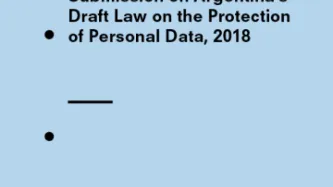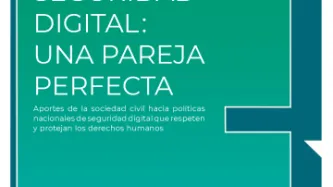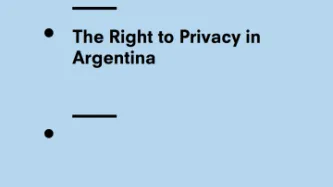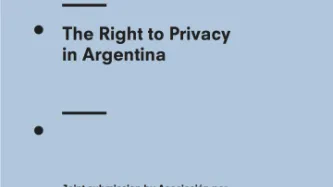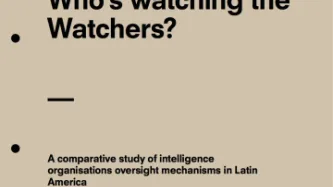Search
Content type: Examples
Following Ms. Vestager’s investigation into Amazon and its own sector enquiry into online price comparison services in October 2017, in June 2018 the German Federal Cartel Office (“Bundeskartellamt”) claimed that it “received a lot of complaints” and is said to be “looking at the role and market power of Amazon” with regards to Amazon’s hybrid function. (Nicholas Hirst, MLEX, 27 June 2018, Amazon’s ‘hybrid function’ catches eye of German antitrust enforcers.) Germany is Amazon’s…
Content type: News & Analysis
The first half of 2018 saw two major privacy moments: in March, the Facebook/ Cambridge Analytica scandal broke, followed in May by the EU General Data Protection Regulation ("GDPR") taking effect. The Cambridge Analytica scandal, as it has become known, grabbed the attention and outrage of the media, the public, parliamentarians and regulators around the world - demonstrating that yes, people do care about violations of their privacy and abuse of power. This scandal has been one of…
Content type: Examples
In the lead up to the 2017 German federal election (Bundestagswahl), all political parties used social media like Facebook, Twitter, Instagram, YouTube, and e-mails as platforms to reach voters.
The far-right Alternative for Germany party (AfD) reportedly hired a Texas-based company for their campaign. Harris Media is known for their work with Republican, far-right and nationalist candidates in the US and worldwide. In 2017, Privacy International revealed that Harris Media was behind the…
Content type: Examples
In the lead up to the German elections, the conservative Christian Democratic Union (CDU) created a mobile app, Connect 17, which was designed to create a feedback loop between party headquarters and door-to-door volunteers (also known as canvassers).
The app drew on data from the federal statistics office and polling agencies. It let canvassers decide routes, record whether anyone was home, and whether a conversation had been successful. It also allowed canvassers to compare their…
Content type: Examples
The Sunday edition of the national newspaper Bild reported that Chancellor Angela Merkel's conservative Christian Democrats (CDU) party and the centre-right Free Democrats (FDP) party purchased "more than a billion" pieces of personal data about potential voters from a subsidiary of Deutsche Post, which offered target-mailing concepts to its clients. The Deutsche Post subsidiary, Deutsche Post Direkt, rejected these claims.
Instead, Deutsche Post is reported as insisting that it never…
Content type: State of Privacy
Table of contents
Introduction
Right to Privacy
Communication Surveillance
Data Protection
Identification Schemes
Policies and Sectoral Initiatives
Introduction
Acknowledgement
The State of Privacy in Argentina is the result of an ongoing collaboration by Privacy International and Asociación por los Derechos Civiles (ADC).
Key Privacy Facts
1. Constitutional privacy protections: While Argentina's constitution does not mention the word 'privacy', Section 19 has been taken by the…
Content type: Advocacy
In September 2018, the National Executive sent the proposed Data Protection Bill to the National Congress. The proposed law was directed to the Senate and it will be considered by two commissions: the Commission of Constitutional Affairs (Comision de Asuntos Constitucionales) and the Commission of Rights and Guarantees (Comision de Derechos y Garantías).
Privacy International welcomes the continued efforts by Argentina to provide protections for the right to privacy, already enshrined in the…
Content type: News & Analysis
Creative Commons Photo Credit: Source
In September 2018, a month after Argentina lawmakers voted against the legalisation of abortion, we spoke to Eduardo Ferreyra from the Buenos Aires-based Asociacion por los Derechos Civiles about the role of privacy in the abortion debate. Also joining us in this second episode of the Gender and Privacy Series is Ambika Tandon from the Centre for Internet and Society in India to discuss the intersection between privacy and bodily autonomy.…
Content type: Examples
Police in the German state of Hesse are using a bespoke version of Palantir's Gotham software system, specially adapted for the police force. Palantir CEO Alex Karp sits on the board of the German mega publisher Axel Springer.
Publication: WorldCrunch, Jannis Brühl
Date: 20 November 2018
Content type: News & Analysis
Image attribution: By Blue Diamond Gallery CC BY-SA 3.0.
In March 2017, when the UN Human Rights Council requested the High Commissioner for Human Rights to prepare a report on the right to privacy in the digital age, including the responsibility of business enterprises, Cambridge Analytica was an obscure company among others. A year later the data exploitation scandal erupted, leading to plenty of soul searching by politicians in US, UK, Europe and elsewhere, pledges of…
Content type: News & Analysis
Actualmente, las empresas tecnológicas se encuentran inmersas en constante cambio. Uno de ellos es la creciente importancia que ha cobrado la seguridad digital, convirtiéndose en una prioridad. Que un emprendimiento resguarde su seguridad digital significa que puede gestionar los riesgos asociados a mantener la confidencialidad, integridad y disponibilidad de su información.
En este contexto, resulta de gran relevancia que las personas responsables del emprendimiento digital y el…
Content type: News & Analysis
El objetivo es facilitar a la sociedad civil una guía para la navegación de este organismo, efectuar un diagnóstico que permita situar cualquier persona interesada sobre la actualidad de la temática a nivel regional y descubrir la agenda de seguridad digital que sostiene la OEA en el continente.
Finalmente, concluimos con una serie de breves recomendaciones dirigidas a los organismos de la OEA. Con ello, esperamos que este órgano reconozca el papel que puede jugar como catalizador en el…
Content type: Report
La seguridad digital es una discusión crítica y hay que reconocer que la sociedad civil y los grupos de interés público no han sido suficientemente considerados. Como respuesta, varias organizaciones de la sociedad civil de América Latina se unieron para presentar informes que recuerdan a las entidades estatales responsables de formulación de políticas públicas que la seguridad digital debe tener en cuenta la seguridad de las personas y los derechos humanos. Presentamos la serie, Derechos…
Content type: News & Analysis
Private surveillance companies selling some of the most intrusive surveillance systems available today are in the business of purchasing security vulnerabilities of widely-used software, and bundling it together with their own intrusion products to provide their customers unprecedented access to a target’s computer and phone.
It's been known for some time that governments, usually at a pricey sum, purchase such exploits, known as zero- and one-day exploits, from security researchers to…
Content type: Long Read
To celebrate Data Privacy Week, we spent the week discussing privacy and issues related to control, data protection, surveillance, and identity. Join the conversation on Twitter using #dataprivacyweek.
Do you live in a “smart city”? Chances are, you probably do (or at least your city claims to be). But do you know what exactly makes your city “smart”, beyond the marketing term? And what does this have to do with privacy?
Companies and governments will tell you that the more cameras, sensors…
Content type: Long Read
To celebrate International Data Privacy Day (28 January), PI and its International Network have shared a full week of stories and research, exploring how countries are addressing data governance in light of innovations in technology and policy, and implications for the security and privacy of individuals.
According to the World Bank, identity “provides a foundation for other rights and gives a voice to the voiceless”. The UN Deputy Secretary-General has called it a tool for “advancing…
Content type: Advocacy
Este informe es presentado por la Asociación por los Derechos Civiles (ADC) y Privacy International (PI). La Asociación por los Derechos Civiles (ADC) es una organización no gubernamental, sin nes de lucro, ubicada en Buenos Aires, que promueve los derechos civiles y sociales en Argentina y otros países latinoamericanos. Fue fundada en 1995 con el objetivo de fortalecer una cultura jurídica e institucional que garantice los derechos fundamentales de la gente, basado en el respeto a la…
Content type: News & Analysis
This piece was co-written with Valeria Milanes of the Asociación por los Derechos Civiles (ADC). A Spanish version is available here.
In January 2015, the intelligence regime in Argentina was put in the limelight following the death of Prosecutor Alberto Nisman. It was alleged that the intelligence services were involved in his death. This scandal prompted reform of the country’s intelligence system.
In February of the same year, the Intelligence Act (N° 25…
Content type: Advocacy
This stakeholder report is a submission by Asociación por los Derechos Civiles (ADC) and Privacy International (PI). The Asociación por los Derechos Civiles (ADC) is a non-governmental, non-pro t organisation based in Buenos Aires that promotes civil and social rights in Argentina and other Latin American countries. It was founded in 1995 with the purpose of helping to strengthen a legal and institutional culture that guarantees the fundamental rights of the people, based on respect…
Content type: News & Analysis
This guest piece was written by Leandro Ucciferri of the Association for Civil Rights (Asociación por los Derechos Civiles). It does not necessarily reflect the views or position of Privacy International.
We look at our smartphone first thing in the morning to check the weather, and our to-do list for the day. During breakfast, we read the news and learn about what is going on in the rest of the world. In our commute to work or college, we scroll through our social media feeds…
Content type: Long Read
The use of IMSI catchers[1] to arrest individuals is rarely documented — as IMSI catchers are used secretively in most countries. The arrest of Colombian drug lord Henry López Londoño in Argentina is therefore a rare opportunity to understand both how IMSI catchers are used, and also the complexity of their extraterritorial use.
In October 2012, Londoño — also known as Mi Sangre (“My Blood”) — was arrested in Argentina. His arrest was the result of cooperation between the Dirección de…
Content type: News & Analysis
Este artículo fue co-escrita con Valeria Milanes de la Asociación por los Derechos Civiles (ADC). Una versión en ingles está disponible aquí.
En Enero de 2015, el sistema de inteligencia de Argentina fue objeto de atención pública luego de la muerte del fiscal Alberto Nisman, debido a la presunta participación de los servicios de inteligencia en dicho suceso. Este escándalo impulsó la reforma del sistema de inteligencia del país.
En Febrero del mismo…
Content type: Press release
This week in Geneva, the UN Human Rights Committee will examine the Argentina’s compliance with the International Covenant on Civil and Political Rights (ICCPR), an international treaty which places obligations on signatories to guarantee human rights such as the right to privacy.
This review, by a body of independent experts charged with monitoring compliance with the ICCPR, comes at a critical time for Argentina laws and policies on privacy and surveillance.
Recent years have seen…
Content type: Press release
Esta semana en Ginebra, el Comité de Derechos Humanos de la ONU examinará el cumplimiento de la Argentina con el Pacto Internacional de Derechos Civiles y Políticos (PIDCP), un tratado internacional que establece obligaciones a los firmantes para garantizar los derechos humanos, como el derecho a la privacidad.
Este examen, por un grupo de expertos independientes encargados de vigilar el cumplimiento del PIDCP, llega en un momento crítico para las leyes y políticas de la Argentina sobre la…
Content type: Advocacy
La Asociación por los Derechos Civiles (ADC) y Privacy International toman nota de las respuestas del gobierno de Argentina a la lista de cuestiones antes de la presentación del informe, en particular en relación a la legislación, políticas y prácticas relacionadas con la vigilancia y la protección de los datos personales.
Privacy International es una organización de derechos humanos que trabaja para favorecer y promover el derecho a la privacidad y la lucha contra la vigilancia en todo el…
Content type: Advocacy
Asociación por los Derechos Civiles (ADC) and Privacy International note the replies by the government of Argentina to the list of issues prior to the submission of the report, in particular in relation to the laws, policies and practices related to surveillance and protection of personal data.
Privacy International is a human rights organisation that works to advance and promote the right to privacy and fight surveillance around the world. The Asociación por los Derechos Civiles (ADC) is a…
Content type: Advocacy
La Asociación por los Derechos Civiles (ADC) y Privacy International toman nota de las respuestas del gobierno de Argentina a la lista de cuestiones antes de la presentación del informe, en particular en relación a la legislación, políticas y prácticas relacionadas con la vigilancia y la protección de los datos personales.
Privacy International es una organización de derechos humanos que trabaja para favorecer y promover el derecho a la privacidad y la lucha contra la vigilancia en todo el…
Content type: Press release
A 400 gigabyte trove of internal documents belonging to surveillance company Hacking Team has been released online. Hacking team sells intrusive hacking tools that have allegedly been used by some of the most repressive regimes in the world.
The documents reportedly confirm Hacking Team has customers in 35 countries, including some that routinely abuse human rights. These documents seemingly validate research conducted by Citizen Lab…
Content type: News & Analysis
UPDATE: Argentina's President Cristina Fernandez de Kirchner has announced plans to disband Argentina's intelligence agency. Go here for more, and keep reading below.
This post was originally published on 20 January 2015 by Privacy International's partner in Argentina, the Asociación por los Derechos Civiles (ADC). To read the original post, please go here.
In view of the serious incidents that took place on 18 January 2015, the Asociación por los Derechos Civiles (ADC)…
Content type: Report
In societies that are in the process of transition towards democracy, democratic control of intelligence organisations is both an indispensable requirement and a pressing need. In many cases, the most serious human rights violations committed by dictatorial governments were intrinsically linked to draconian surveillance and control systems. Systematic spying on trade unions, students and dissident groups was a common feature of 20th-century dictatorships. The persistent violation of citizens’…






